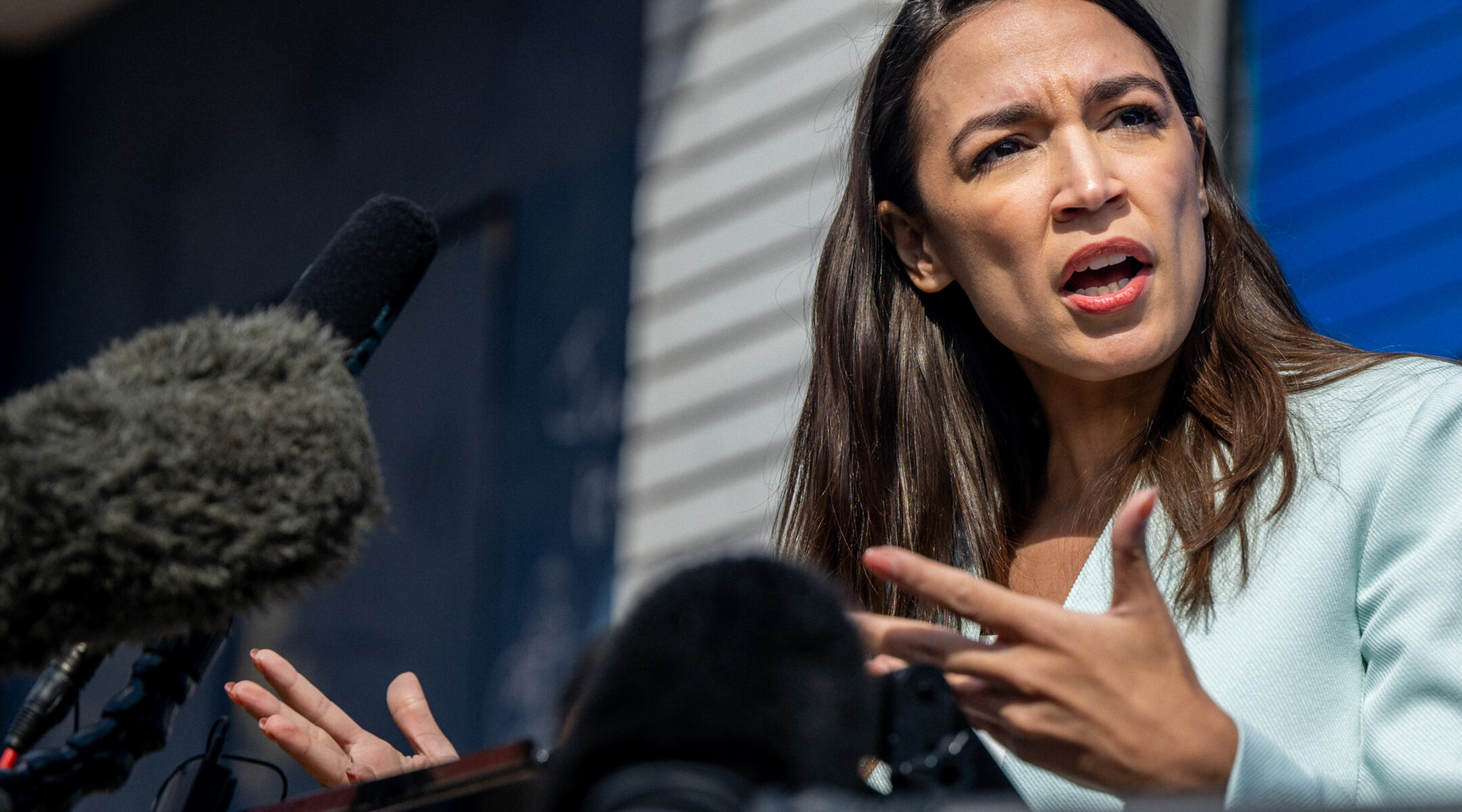Rep. Alexandria Ocasio-Cortez condemned antisemitism but accused her critics of “weaponizing” the term in a rare public discussion with two Jewish activists who have shined a spotlight on bigotry against Jews in the pro-Palestinian movement.
“Antisemitism, hate and violence against Jews because of their identity is real and it is dangerous,” the New York City Democratic congresswoman said at the start of the virtual discussion on Monday. She added, “When the Jewish community is threatened, the progressive movement is undermined.”
But later, she said, “It is also true that accusations and false accusations of antisemitism are wielded against people of color and women of color by bad-faith political actors, and weaponizing antisemitism is used to divide us.”
In the eight months since the outbreak of the Israel-Hamas war on Oct. 7, Ocasio-Cortez has called out antisemitism while becoming increasingly critical of Israel’s war effort. Like the other members of the progressive “Squad” in Congress, she has accused Israel of perpetrating a “genocide” and committing atrocities in Gaza. She is one of the most vocal supporters of Rep. Jamaal Bowman, a fellow New York progressive Democrat and Squad member facing a tough primary challenge from a centrist official this month because of his condemnations of Israel.
Against that backdrop, Monday’s 30-minute event, titled “Antisemitism and the Fight for Democracy,” was notable because Ocasio-Cortez was speaking with Jewish activists who have publicly decried antisemitism among the pro-Palestinian protest movement.
One, Amy Spitalnick, is the CEO of the Jewish Council for Public Affairs and gained prominence for successfully suing the organizers of the 2017 far-right rally in Charlottesville, Virginia. The other, Stacy Burdett, is a former senior official at the Anti-Defamation League and U.S. Holocaust Memorial Museum.
The discussion sought to call out antisemitism in the leftist political space and delineate when criticism of Israel veers into discrimination, as the progressive movement grapples with anti-Jewish bigotry in protests and rhetoric surrounding the war in Gaza.
“There is very real antisemitism that is in fact showing up in progressive spaces right now,” Spitalnick said. “It’s more personally painful to see what’s happening in my own progressive community because it’s happening in my own community.”
Ocasio-Cortez faced pressure to condemn antisemitism immediately after the Hamas attack that launched the war, when the Democratic Socialists of America, of which she is a member, announced an Oct. 8 rally in Times Square called “All out for Palestine.” The following day, Ocasio-Cortez condemned the rally, saying, “It should not be hard to shut down hatred and antisemitism where we see it.”
She tried to drive the same point home on Monday, calling antisemitism “an assault on our values as Americans and especially as progressives.”
“Antisemitism is on the rise in America and across the world. Acknowledging that fact does not take away from fights for liberation, it actually advances them,” Ocasio-Cortez said. “Some of this discussion can be complicated but a lot of this is not complicated at all. We can and should be equipping ourselves with the tools to recognize when actual antisemitism is clear and present and also how to check it immediately.”
But she also sought to defend her fellow progressives from charges of antisemitism for criticizing Israel.
“It is also important to say in this moment and during that conversation that criticism of the Israeli government is not inherently antisemitic and criticism of Zionism is not automatically antisemitic,” Ocasio-Cortez said. At one point, she said discussion of antisemitism had started to feel “impossible” because “the way some have weaponized the issue can make others defensive.”
She did not say who she was accusing of “weaponizing” antisemitism to attack women and people of color. But since Oct. 7, she has accused the pro-Israel lobby AIPAC of targeting women in Congress and elected officials of color. And she also referenced Palestinian suffering.
“When it comes to the current conflict it is possible to recognize Jewish pain, grief and fear, and that does not take away from our grief and pain for families in Gaza,” she said. “We are all in this together, whether we like it or not.”
Spitalnick and Burdett sought to describe how antisemitism can manifest in progressive spaces.
Spitalnick said examples of antisemitism on the left included celebration or denial of the Oct. 7 attack, embracing Hamas, wielding eliminationist rhetoric against Israel and targeting Jewish institutions.
Progressive Jews are “being told they can’t show up as their full Jewish selves,” Spitalnick said, citing calls to ban Hillel from campuses, endorsing violence against Zionists, and blacklists of “Zionist” authors.
Burdett, who has testified in front of Congress about campus antisemitism in the wake of Oct. 7, talked about the challenge of understanding antisemitism given that many Jews identify as white.
“None of us were conditioned to think about a group of mostly white people as scared and vulnerable. In our lifetimes antisemitism was marginalized,” she said. “It’s a shock to all of our systems. It means we have some relearning to do.”
She said, “The uptick in antisemitism isn’t brand new. Jews have been disproportionately targeted by hate violence for years.” She added that the issue “doesn’t fit neatly into how we think about racial injustice.”
The speakers agreed that anti-Jewish discrimination represents a larger threat to American democracy and other minority groups, as well as to the success of progressive politics.
“Antisemitism is a threat to Jews and to the progressive movement,” Ocasio-Cortez said. “Just like racism, anti-Black racism, Islamophobia and misogyny, it makes all of us unsafe.”
The New York Jewish Week brings you the stories behind the headlines, keeping you connected to Jewish life in New York. Help sustain the reporting you trust by donating today.





